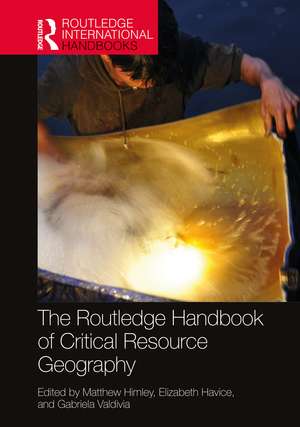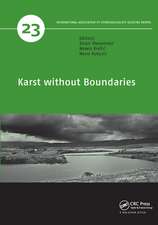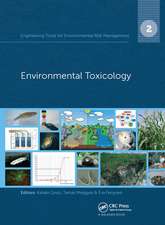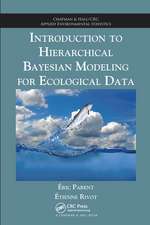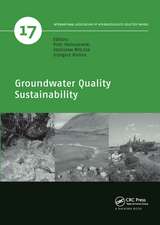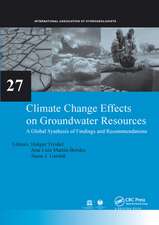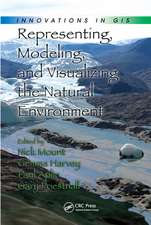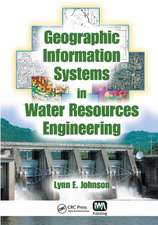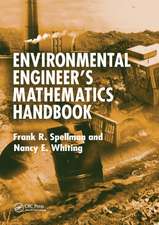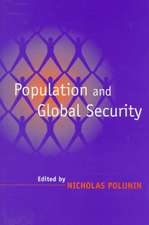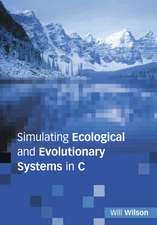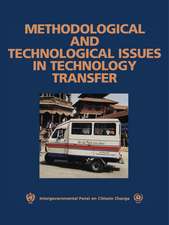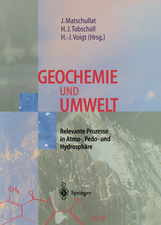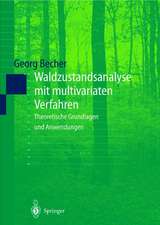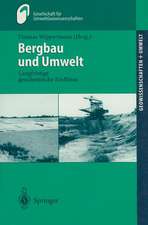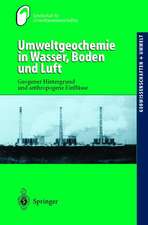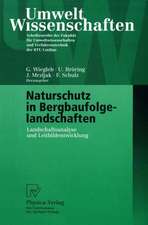The Routledge Handbook of Critical Resource Geography: Routledge International Handbooks
Editat de Matthew Himley, Elizabeth Havice, Gabriela Valdiviaen Limba Engleză Paperback – 29 ian 2024
The volume has an introduction and four thematic sections. The introductory chapter outlines key trajectories for thinking critically with and about resources. Chapters in Section I, "(Un)knowing resources," offer distinct epistemological entry points and approaches for studying resources. Chapters in Section II, "(Un)knowing resource systems," examine the components and logics of the capitalist systems through which resources are made, circulated, consumed, and disposed of, while chapters in Section III, "Doing critical resource geography: Methods, advocacy, and teaching," focus on the practices of critical resource scholarship, exploring the opportunities and challenges of carrying out engaged forms of research and pedagogy. Chapters in Section IV, "Resource-making/world-making," use case studies to illustrate how things are made into resources and how these processes of resource-making transform socio-environmental life.
This vibrant and diverse critical resource scholarship provides an indispensable reference point for researchers, students, and practitioners interested in understanding how resources matter to the world and to the systems, conflicts, and debates that make and remake it.
| Toate formatele și edițiile | Preț | Express |
|---|---|---|
| Paperback (1) | 305.97 lei 6-8 săpt. | |
| Taylor & Francis – 29 ian 2024 | 305.97 lei 6-8 săpt. | |
| Hardback (1) | 1544.82 lei 6-8 săpt. | |
| Taylor & Francis – 13 iul 2021 | 1544.82 lei 6-8 săpt. |
Din seria Routledge International Handbooks
-
 Preț: 371.78 lei
Preț: 371.78 lei -
 Preț: 375.50 lei
Preț: 375.50 lei -
 Preț: 362.20 lei
Preț: 362.20 lei -
 Preț: 352.09 lei
Preț: 352.09 lei - 9%
 Preț: 1487.73 lei
Preț: 1487.73 lei - 5%
 Preț: 317.32 lei
Preț: 317.32 lei -
 Preț: 372.05 lei
Preț: 372.05 lei -
 Preț: 361.20 lei
Preț: 361.20 lei -
 Preț: 390.14 lei
Preț: 390.14 lei -
 Preț: 311.91 lei
Preț: 311.91 lei - 9%
 Preț: 1488.70 lei
Preț: 1488.70 lei -
 Preț: 390.23 lei
Preț: 390.23 lei -
 Preț: 347.75 lei
Preț: 347.75 lei -
 Preț: 347.75 lei
Preț: 347.75 lei - 9%
 Preț: 1490.13 lei
Preț: 1490.13 lei -
 Preț: 356.23 lei
Preț: 356.23 lei -
 Preț: 348.29 lei
Preț: 348.29 lei - 5%
 Preț: 328.13 lei
Preț: 328.13 lei -
 Preț: 394.25 lei
Preț: 394.25 lei - 8%
 Preț: 392.90 lei
Preț: 392.90 lei - 8%
 Preț: 422.42 lei
Preț: 422.42 lei -
 Preț: 357.23 lei
Preț: 357.23 lei - 8%
 Preț: 421.97 lei
Preț: 421.97 lei - 5%
 Preț: 452.17 lei
Preț: 452.17 lei - 9%
 Preț: 1665.72 lei
Preț: 1665.72 lei - 9%
 Preț: 1651.64 lei
Preț: 1651.64 lei -
 Preț: 350.21 lei
Preț: 350.21 lei -
 Preț: 381.91 lei
Preț: 381.91 lei -
 Preț: 345.64 lei
Preț: 345.64 lei -
 Preț: 347.75 lei
Preț: 347.75 lei - 20%
 Preț: 1401.04 lei
Preț: 1401.04 lei -
 Preț: 342.77 lei
Preț: 342.77 lei -
 Preț: 346.78 lei
Preț: 346.78 lei -
 Preț: 345.17 lei
Preț: 345.17 lei -
 Preț: 353.89 lei
Preț: 353.89 lei -
 Preț: 1058.63 lei
Preț: 1058.63 lei -
 Preț: 348.06 lei
Preț: 348.06 lei - 5%
 Preț: 337.34 lei
Preț: 337.34 lei -
 Preț: 365.90 lei
Preț: 365.90 lei - 9%
 Preț: 1528.89 lei
Preț: 1528.89 lei -
 Preț: 346.12 lei
Preț: 346.12 lei -
 Preț: 392.49 lei
Preț: 392.49 lei - 9%
 Preț: 1454.53 lei
Preț: 1454.53 lei - 9%
 Preț: 1492.85 lei
Preț: 1492.85 lei - 5%
 Preț: 326.87 lei
Preț: 326.87 lei -
 Preț: 361.75 lei
Preț: 361.75 lei - 9%
 Preț: 1349.84 lei
Preț: 1349.84 lei - 19%
 Preț: 422.81 lei
Preț: 422.81 lei - 8%
 Preț: 385.56 lei
Preț: 385.56 lei
Preț: 305.97 lei
Preț vechi: 349.10 lei
-12% Nou
Puncte Express: 459
Preț estimativ în valută:
58.57€ • 63.64$ • 49.23£
58.57€ • 63.64$ • 49.23£
Carte tipărită la comandă
Livrare economică 21 aprilie-05 mai
Preluare comenzi: 021 569.72.76
Specificații
ISBN-13: 9781032023113
ISBN-10: 1032023112
Pagini: 494
Ilustrații: 56
Dimensiuni: 174 x 246 mm
Greutate: 0.45 kg
Ediția:1
Editura: Taylor & Francis
Colecția Routledge
Seria Routledge International Handbooks
Locul publicării:Oxford, United Kingdom
ISBN-10: 1032023112
Pagini: 494
Ilustrații: 56
Dimensiuni: 174 x 246 mm
Greutate: 0.45 kg
Ediția:1
Editura: Taylor & Francis
Colecția Routledge
Seria Routledge International Handbooks
Locul publicării:Oxford, United Kingdom
Public țintă
Postgraduate and UndergraduateCuprins
1. Critical Resource Geography: An Introduction SECTION I (Un)Knowing Resources 2. Chimeras of Resource Geographies: Unbounding Ontologies and Knowing Nature 3. Knowing the Storyteller: Geohumanities and Critical Resource Geography 4. Material Worlds Redux: Mobilizing Materiality within Critical Resource Geography 5. Temporalities of (Un)Making a Resource: Oil Shales Between Presence and Absence 6. Brave New Worms: Orienting (Non)Value in the Parasite Bioeconomy 7. Resources Is Just Another Word for Colonialism SECTION II (Un)Knowing Resource Systems 8. Resistance Against the Land Grab: Defensoras and Embodied Precarity in Latin America 9. Gender in Extractive Industry: Toward a Feminist Critical Resource Geography of Mining and Hydrocarbons 10.The Plantation Town: Race, Resources, and the Making of Place 11. Materializing Space, Constructing Belonging: Toward a Critical-Geographical Understanding of Resource Nationalism 12. Resources in a World of Borders, Boundaries, and Barriers: Dividing, Circumscribing, Confining 13. Pets or Meat: A Resource Geography of Dogs in China, from Chairman Mao (1949–1976) to the Pet Fair Asia Fashion Show (2015–2020) 14. The Social Production of Resources: A Marxist Approach 15. World-Systems Theory, Nature, and Resources 16. The Corporation and Resource Geography SECTION III Doing Critical Resource Geography: Methods, Advocacy, and Teaching 17. Life with Oil Palm: Incorporating Ethnographic Sensibilities in Critical Resource Geography 18. Institutional Ethnography: A Feminist Methodological Approach to Studying Institutions of Resource Governance 19. Critical Physical Geography: In Pursuit of Integrative and Transformative Approaches to Resource Dynamics 20. Praxis in Resource Geography: Tensions Between Engagement and Critique in the (Un)Making of Ecosystem Services 21. Negotiating the Mine: Commitments, Engagements, Contradictions 22. Intergenerational Equity and the Geographical Ebb and Flow of Resources: The Time and Space of Natural Capital Accounting 23. Research as Action and Performance: Learning with Activists in Resource Conflicts 24. Engaged Research with Smallholders and Palm Oil Firms: Relational and Feminist Insights from the Field 25. Renewable Energy Landscapes and Community Engagements: The Role of Critical Resource Geographers Beyond Academia 26. Learning about Coal Frontiers: From the Mountains of Appalachia to the Streets of South Baltimore 27. Teaching Critical Resource Geography: Integrating Research into the Classroom SECTION IV Resource Making/World Making 28. Soy, Domestication, and Colonialism 29. From Gold to Rosewood: Agrarian Change, High-Value Resources, and the Flexible Frontier-Makers of the Twenty-First Century 30. Conservation and the Production of Wildlife as Resource 31. Anadromous Frontiers: Reframing Citizenship in Extractive Regions. The Salmon Industry in Los Lagos, Chile 32. Extracting Fish 33. Human Tissue Economies: Making Biological Resources 34. Making, and Remaking, a World of Carbon: Uneven Geographies of Carbon Sequestration 35. World-Making and the Deep Seabed: Mining the Area Beyond National Jurisdiction 36. World-Making Through Mapping: Large Scale Marine Protected Areas and the Transformation of the Global Ocean 37. Mapping Resources: Mapping as Method for Critical Resource Geographies
Notă biografică
Matthew Himley is an Associate Professor of Geography at Illinois State University. He is a nature-society geographer with interests in the political ecology and political economy of resource industries, especially in the Andean region of South America. His recent research focuses on the historical role of science in mineral extraction and state formation in Peru.
Elizabeth Havice is an Associate Professor of Geography at the University of North Carolina at Chapel Hill. She uses the lens of governance to explore distributional outcomes in marine spaces, food systems, and global value chains. She is a cofounder of the Digital Oceans Governance Lab that explores intersections of data technologies and oceans governance.
Gabriela Valdivia is a Professor of Geography at the University of North Carolina at Chapel Hill. She is a feminist political ecologist examining the relationship between resources and socio-environmental inequities. Gabriela is an author of the digital project Crude Entanglements, which explores the affective dimensions of oil production, and a coauthor of Oil, Revolution, and Indigenous Citizenship in Ecuadorian Amazonia.
Elizabeth Havice is an Associate Professor of Geography at the University of North Carolina at Chapel Hill. She uses the lens of governance to explore distributional outcomes in marine spaces, food systems, and global value chains. She is a cofounder of the Digital Oceans Governance Lab that explores intersections of data technologies and oceans governance.
Gabriela Valdivia is a Professor of Geography at the University of North Carolina at Chapel Hill. She is a feminist political ecologist examining the relationship between resources and socio-environmental inequities. Gabriela is an author of the digital project Crude Entanglements, which explores the affective dimensions of oil production, and a coauthor of Oil, Revolution, and Indigenous Citizenship in Ecuadorian Amazonia.
Descriere
With original contributions from more than 60 authors with expertise in a wide range of resource types and world regions, this handbook offers an essential guide to the study of resources and their role in socio-environmental change.
